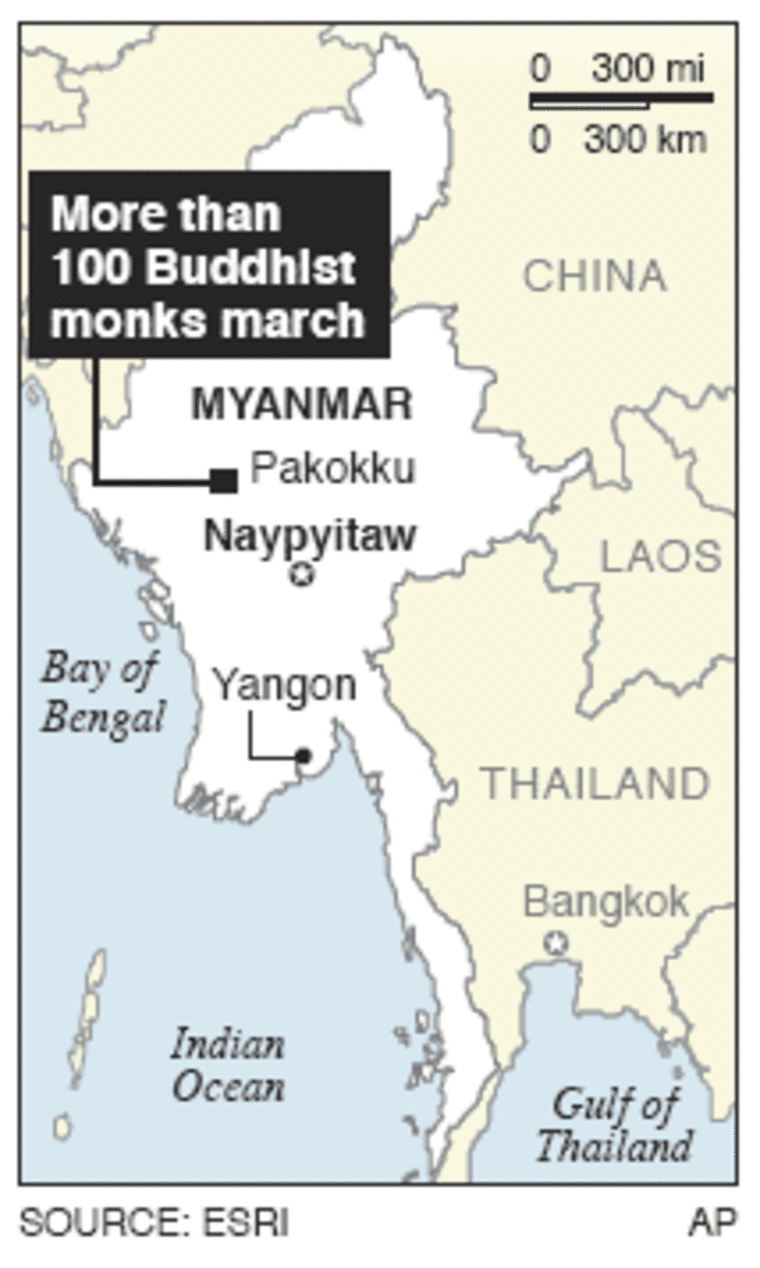More than 100 Buddhist monks marched in northern Myanmar for nearly an hour Wednesday, the first public demonstration since the government’s deadly crackdown last month on pro-democracy protesters, several monks said.
The monks in Pakokku shouted no slogans, but one monk told the Democratic Voice of Burma, a Norway-based short-wave radio station and Web site run by dissident journalists, that the demonstration was a continuation of the protests in September.
“We are continuing our protest from last month as we have not yet achieved any of the demands we asked for,” the monk told Democratic Voice of Burma.
“Our demands are for lower commodity prices, national reconciliation and immediate release of (opposition leader) Aung San Suu Kyi and all the political prisoners,” said the monk, who was not identified by name.
Bigger protests planned?
He said they had little time to organize so the march was small but “there will be more organized and bigger protests soon.”
The demonstrations in Yangon last month numbered up to 100,000 people and were crushed when troops fired on protesters Sept. 26-27. The crackdown left at least 10 people dead by the government’s count, though opposition groups say as many as 200 people may have been killed. The military junta’s crushing move drew international condemnation.

Pakokku, a center for Buddhist learning with more than 80 monasteries about 390 miles northwest of the commercial center of Yangon, was the site of the first march last month by monks as they joined — and then spearheaded — the biggest anti-government protests in nearly two decades.
The protests originally started Aug. 19, when ordinary citizens took to the streets to vent anger after the government hiked fuel prices as much as 500 percent. The rallies gained momentum when Buddhist monks in Pakokku joined the protests in early September.
Reports that troops had beaten protesting monks in Pakokku on Sept. 6 rallied monks around the country to join the burgeoning marches.
On Wednesday, the monks started out at Pakokku’s Shwegu Pagoda, marching for nearly an hour and chanting Buddhist prayers without incident. They then returned to their respective monasteries, two monks said in telephone interviews, speaking on condition of anonymity for fear of reprisals.
Pro-junta rally
The march came after a pro-junta rally in town. Opposition groups in exile claim such rallies are stage-managed by the government.
Historically, monks in Myanmar, who are revered in the country, have been at the forefront of protests, first against British colonialism and later military dictatorship.
They played a prominent part in the failed 1988 pro-democracy rebellion that sought an end to military rule, imposed since 1962. The junta held general elections in 1990, but refused to honor the results when Suu Kyi’s National League for Democracy party won. Suu Kyi has been detained under house arrest for more than 12 of the past 18 years.
Also Wednesday, the NLD said the military government had freed seven of its members who were held for more than a month following the crackdown on the protests.
The releases Tuesday night came ahead of a visit by U.N. special envoy Ibrahim Gambari to seek reconciliation between the junta and democratic forces. The seven had been detained at the infamous Insein Prison in Yangon, said Nyan Win, a spokesman for the NLD.
“All these people had been arrested unnecessarily and we demand the immediate and unconditional release of all those detained arbitrarily,” said Han Tha, another NLD spokesman. He added that at least 150 party members out of nearly 300 arrested since September remain in detention.
Han Tha said many of them have been denied proper medical treatment and faced harsh conditions.
The government earlier had said it detained about 3,000 people in connection with the protests but had released most of them.